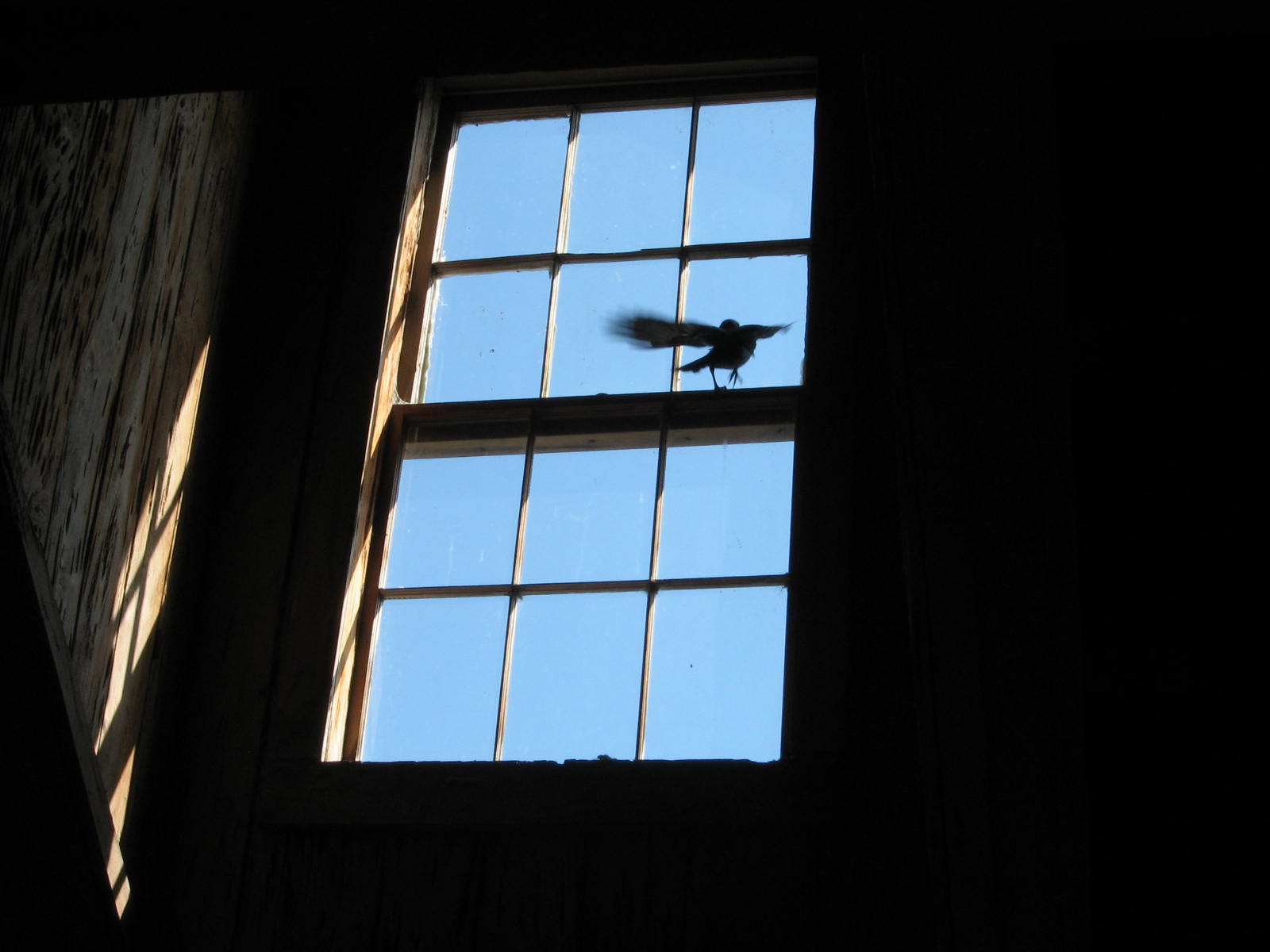Posts Tagged ‘chrisshea’
The Five Mindfulness Trainings For A Peace Filled Life
A few years ago, while travelling through South Carolina, I was touring an old barn when I noticed, above me in the ceiling, a large bird was frantically trying to escape the barn. The bird continued to fly into the closed window in its frantic desire to escape the barn. Attempt after attempt, nothing changed for the bird. It flew towards the closed window, smashed into the window, and once again flew into the closed window. Presumably unbeknownst to this anxious bird, the barn doors, one on each end of the barn, were wide open! Had the frantic bird simply stopped a moment to observe its surroundings, it would have noticed a very easy escape into the freedom of the outside sky. Yet, the bird was so focused on the task in front of it that it failed to see any alternate options.
I mention this story as I recalled it a couple days ago while at my house. I happened upon a butterfly, who, in similar manner to the bird I described above, was frantically flying against a screen on my porch in an attempt to escape the enclosure. Also, similarly to the story above, immediately behind the butterfly was the open door. Yet, as in the story of the bird, the butterfly also did not pause to observe its surroundings. Instead, the butterfly continued flying into the screen (as a side note, I did help the butterfly to escape).
I empathize with both the bird and the butterfly for I too have found myself “banging my head” against that fictitious window or screen in an attempt to either change my life’s course or to escape some emotion which I was not willing to face. It has taken decades for me to begin to learn of the benefits of living in the moment and simply be.
In my writings and public speaking I talk often of mindfulness. This is a state of active, open attention on the present. Carefully observing your thoughts and feelings without judging them good or bad. Mindfulness means living in the moment, aware of your current experience, rather than dwelling on the past or anticipating the future. As I reflect on the bird and butterfly I realize that I am not much different from them in that I tend to allow my emotions and crisis moments to take control of my focus. Yet, in my focused awareness (mindfulness), I’m able to see solutions; to see hope.
My journey from a life of harried busyness and much stress, to a life of mindful reflection and life coaching, did not come easily. I began to slowly, over time, realize that banging my head on closed window or a screen was getting me nothing but a headache. It took strength to to stop myself long enough to desire to look around at my world. Once I stopped and looked around, I noticed options and solutions in my life.
The insightful and wise Vietnamese monk, Thich Nhat Hanh, in his book “The Art of Mindfulness”, reflects on what he calls the “Five Mindfulness Trainings”. These “trainings” are intended to guide us to be mindful of ourselves, our pain, and the world around us. Many of us, myself included, purposefully use electronic devices, reading materials, and sometimes even exercise, as a means of distracting ourselves from our reality. As with the bird and the butterfly, not stopping to notice our world does not give the freedom for which we seek.
Here are the “Five Mindfulness Trainings” from Thich Nhat Hanh:
- Compassion
- Generosity
- True love
- Deep listening
- Cultivating good health
When we do our best to accomplish these five trainings, we have set up our thoughts and actions to be mindful, in a state of active, open attention on the present. These trainings are not meant solely for others, that is, not that we only give to others our compassion, generosity, love, listening, and health; but that we give these to ourselves as well.
In mindful awareness we need to be compassionate with ourselves, generous to ourselves, loving oneself, listening to our mind and our body, and give ourselves good health. In taking care of ourselves in this way will we achieve a deep and true inner peace.
Aware of the plight of both the bird and the butterfly as told in the beginning of this article, I encourage all of us not to continually bang our heads in frustration, but in freedom, to learn to live mindfully.
{loadmodule mod_custom,continue the conversation here or on social media}
Taking Time For Me Is Important And Possible
Taking care of oneself is key to finding inner peace, yet most of us don’t take the time to care for ourselves. Why is this? Most of us would probably respond that we don’t have the time, or that we feel selfish if we were to do things for yourself. Many of us put others’ needs ahead of our own, which is noble, but who is caring for you? If you are the one caring for others, who is the one caring for you?
Why is self care so important? What if I were to tell you that the “answer” to finding happiness and inner peace is spending time daily in self-care? It’s true, and that’s why self care is so important. We all have valid demands for our time, but the reasons we use to not care for ourselves are also excuses.
If we are being brutally honest with ourselves we would admit that we make time for what is valuable to us. Honestly, many of us simply don’t value self-care as much as we say we do. I talk about the importance of attending the gym, but I don’t attend since I “dont have the time.” But, take today for example, I could have woke up a bit earlier, moved some appointments around, done some of what I did this morning last night instead, etc. The reality is, the gym, although I know it’s important, is not of value to me at this time.
I’m proposing that we get creative with our daily schedule so that we can fit in self care. How do we do this?
- Evaluate what is valuable to you.
- Review your daily schedule in light of step 1 above.
- Redo your daily schedule to “create” the time for yourself.
- Tell another person of your plan so that you have support and encouragement.
- Do this every day.
Now that self care is of value and we have found a space for it on our daily schedule, let’s talk concretely about what we can do with our new-found time. Many of my clients share that even if they had the time for self care, they wouldn’t know what to do with that time. Sound familiar?
Since we convince ourselves that we don’t have the time for self care, many of us don’t think about what we would do if we did have the time. As you consider what you can do for self care, think small. You don’t have to do something big as anything you do toward self care will work.
Here are some of the things that I do for self care:
- I take a 10 or 20 minute “power” nap most afternoons to recharge and to slow down.
- I read a few pages from a fiction or nonfiction book, or a spiritual publication to gain insight.
- I take a meditative and mindful walk whether I’m at home in the fields and woods, or travelling in a major city.
- I make the time to meditate. If I don’t have the ability to sit in quiet, I will use the moments I do have, such while driving or walking.
- Finding hobbies which I enjoy and that stimulate me, and which have nothing to do with my everyday profession (the later statement is most important).
I know of many people, myself included, who follow these steps but then feel guilty for taking the time for themselves. We need to re-frame that guilt feeling and change our perspective on the importance of self care. When you truly value the importance of self care, the feeling of guilt will go away. Since you now believe in the necessity of self care, there is no reason for guilt. I learned the importance and the value of self care on a flight out west.
Prior to take off, the flight attendants give their safety briefing; how to fasten the seat belt, how the seat transforms into a flotation device suitable for the ocean, and what to do if you lose cabin pressure. I, like most frequent travellers, tune out the briefing. But, on this flight, for no particular reason, the instructions on using the face mask was significant to me. The flight attendant stated something to the effect that if you are travelling with small children, first secure your mask before assisting your child. No way!! How am I supposed to be ok with giving myself life saving oxygen while my child struggles to breathe? Not happening!
But then I had an aha moment. If the masks drop from the ceiling most of the passengers, especially the children, will be upset. It may be a struggle to secure their mask in the frenzy of the moment, and the odds of getting it right the first time is slim as I’m sure I too would be scared and anxious. In the time that it takes to struggle with the child’s mask, what if I pass out? If I pass out prior to securing their mask, then we both are in trouble! I’m no assistance to my child. But, if I secure my mask first it won’t matter how long it takes to help my child since I’m now capable of breathing.
This safety briefing changed my perception on the importance of self care. If I am not capable of providing help, then no one gets help. Taking care of myself allows me the strength and insight to not only learn more deeply about myself, but also the ability to help others.
Self care is necessary, and the key, to finding my inner peace. The more I learn about myself the more capable I am of coming to terms with myself. This union of self is the inner peace we seek.
{loadmodule mod_custom,continue the conversation here or on social media}
How I Became Self-confident And Happy
The other day I was asked “Have you always been this self-confident? Do you ever doubt yourself?” I was somewhat taken aback by these questions as I don’t typically think of myself as confident. My current life activities consists of family, life coaching, counseling, writing, teaching at a university and college, hosting a podcast, giving lectures, and speaking at conferences. I keep myself active, but I enjoy all that I do. Is my enjoyment the self-confidence people see in me?
Self-confidence is defined as a feeling of trust in one’s abilities and talents, yet this definition presupposes that I have an awareness of my abilities and talents. I feel this is the reason why many people lack self-confidence; they don’t recognize their own abilities and therefore wrongly assume that they are unable, or incapable, of performing a task. Actually, I just described myself.
While growing up I was extremely shy and unaware if my abilities and talents. This lack of self-awareness, coupled with my avoidance of others, reinforced in me a belief that I wasn’t capable of much in the way of outward achievement. As a child, and even through my early adulthood, I enjoyed the solitary pursuits of reading, studying and writing. Sure, I had friends with whom I enjoyed doing things, but my friends were few and not among what was known as the ”in crowd”. For me and my insecurities and shyness, they were “safe”.
A lack of self-confidence is typically coupled with a person’s self-esteem, or sense of self-worth. In my experience, though, that assumption wasn’t true. Although I lacked insight into my gifts and talents, I did feel positive about myself. I enjoyed my hobbies and the people I chose to be close to; life was good. My sense of self-worth was high, while at the same time my self-confidence was low.
How can this be? In my early life it meant that I did well in school, but if I were given a task of importance to complete, or asked to give a speech, my mind would immediately jump to the thought “Me?! I don’t have the skill to do this? There have to be people better at this than me!” At the time I failed to realize that I was asked because someone else saw the talent and ability in me. I failed to take into account the perspective of the asker because I failed to recognize my own giftedness. If I couldn’t see it in myself, I was never going to accept that someone else saw what I myself could not.
So, what changed in me, given my history of lack of self-confidence and shyness, that now I am able to speak to large crowds, teach university classes, and train groups of peers? There’s no one event or “aha moment” which made all the difference. For me, it was a progressive shift, through meditation, where I became more self-aware of my giftedness as well as my weaknesses. It is in accepting both aspects of myself that I feel have been the most transformative.
Here are some reflections I have learned in my adult years which have impacted my ability to be self-confident:
- I’m not responsible for other’s happiness. I am responsible for my feelings and my actions toward others. This helps my self-confidence in that I don’t seek nor need the approval of others to know that I am good at what I do. The constructive opinions of family and close friends I respect, but needing to be liked by everyone is no longer a goal of mine.
- Not knowing is ok. Early in my career I stifled myself in that I felt that if I didn’t know everything there was to know in my field, than I was a fraud. I now recognize how wrong I was, but it was in me eventually realizing that even the “experts” in my field didn’t know everything for me to gain confidence in my own knowledge and experience of my field. What I don’t know, I will learn from others and so continue to grow.
- I became empowered in my self-confidence every time I stepped out of my comfort zone only to realize that I did well. The more times I gave something a try and ended with positive results, the more I became confident in my abilities. Yes, those times when it didn’t go well seemed to set me back more than the positive times moved me forward; but regardless, I kept on keeping on. I’m not perfect when it comes to public speaking or teaching, etc, but I do my best, and more times than not there is positive feedback from the audience. Had I not moved out of my comfort zone, my self-confidence would still be quite low.
- As I mentioned above, self-confidence is not to be equated with always being right or knowing everything. Self-confidence grows from an understanding of who you are, the positives and negatives. We all have growth opportunities, so don’t let the fact that you are not “perfect” stop you from feeling self-confident. Feel self-confident knowing that you are both talented and flawed; perfect in some aspects yet need to grow in others.
- Take time for yourself. Self-care is vitally important to physical and mental health. Spending time nurturing yourself and meditating provides you the opportunity to know yourself better. In this self-knowledge you will find your confidence and your growth opportunities. Work on both!
In my continuing journey of self-confidence, I realize that I don’t need to be perfect in all knowledge or skill, but I do need to be self-reflective with a willingness to grow. Take the time to learn about yourself, then step out of your comfort zone and give it try! If it works well, wonderful, do it again! If it doesn’t work well, wonderful, learn from it then do it again!
{loadmodule mod_custom,continue the conversation here or on social media}



